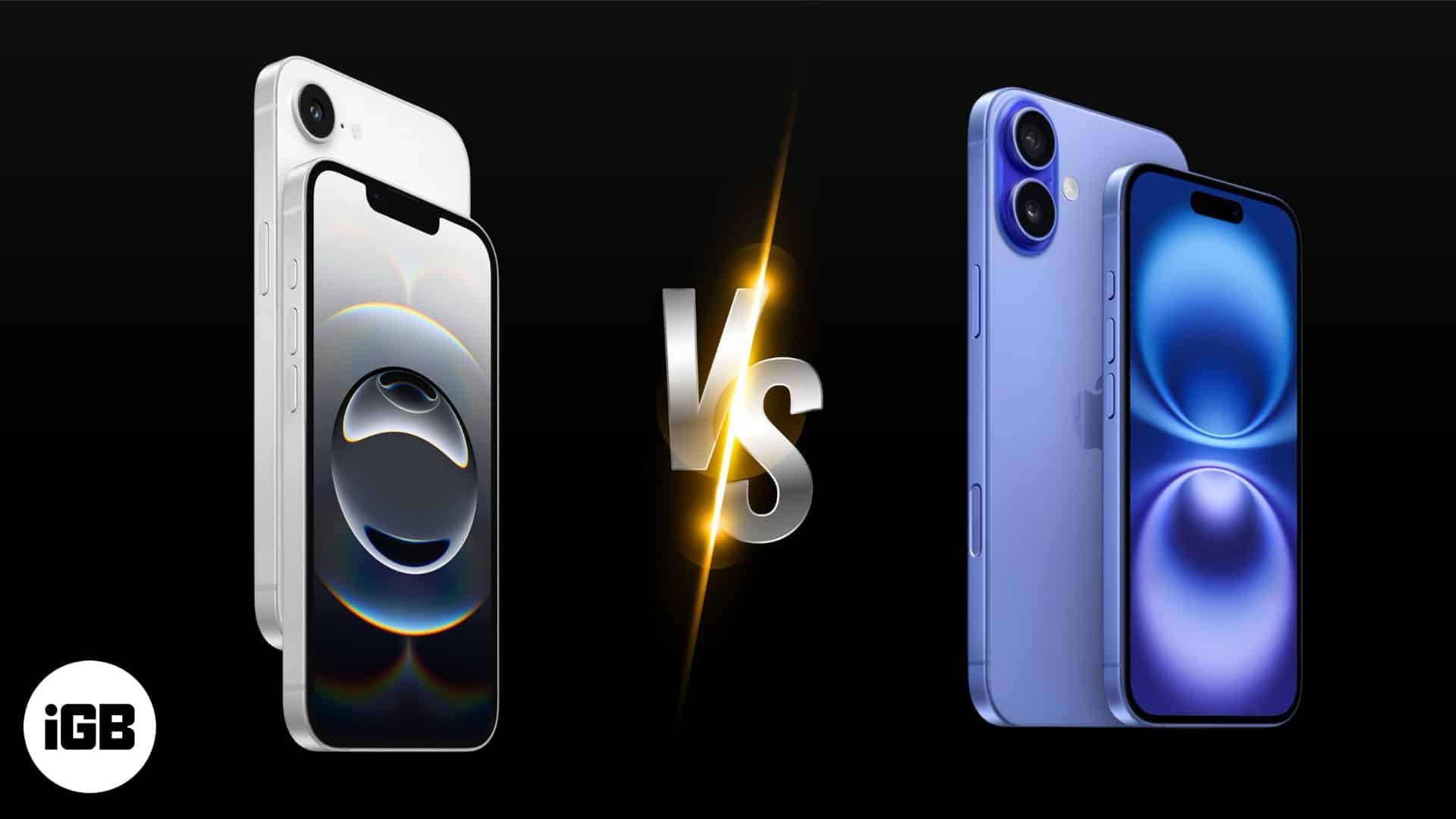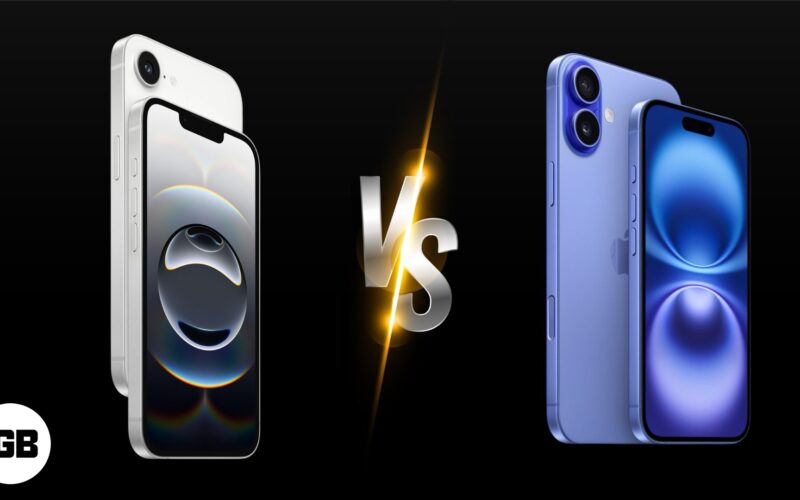Apple has recently expanded its iPhone 16 lineup with the introduction of the iPhone 16e. This new model strikes a perfect balance between performance and affordability, featuring the A18 chip, Apple Intelligence capabilities, a 48MP camera, and more. In this detailed comparison, I’ll break down the differences between the iPhone 16e and the standard iPhone 16 to help you decide which device best suits your needs.

What is the difference between iPhone 16 and 16e?
Before we jump into the details, let’s have a glimpse of the iPhone 16e and iPhone 16 specifications.
| iPhone 16e (2025) | iPhone 16 (2024) |
|---|---|
| 6.1-inch Super Retina XDR OLED display | 6.1-inch Super Retina XDR OLED display |
| Traditional Notch on display | Dynamic Island |
| → 800 nits max brightness (typical) → 1200 nits peak brightness (HDR) | → 1,000 nits max brightness (typical) → 1,600 nits peak brightness (HDR) → 2,000 nits peak brightness (outdoor) → 1 nit minimum brightness |
| Ceramic Shield front | Latest-generation Ceramic Shield front |
| Aluminum glass back | Aluminum with color-infused glass back |
| 5.88 ounces (167 grams) weight | 6.00 ounces (170 grams) weight |
| NA | Camera Control button |
| A18 chip, 8GB RAM | A18 chip, 8GB RAM |
| 4-core GPU | 5-core GPU |
| Single 48MP rear camera 12MP front camera | 48MP + 12MP rear cameras 12MP front camera |
| 1x or 2x optical zoom options | 0.5x, 1x, or 2x optical zoom options |
| Portrait mode with Depth Control | Next-generation portraits with Focus and Depth Control |
| Photographic Styles | Latest-generation Photographic Styles |
| QuickTake video | QuickTake video (up to 4K at 60 fps in Dolby Vision HDR) |
| Optical image stabilization | Sensor-shift optical image stabilization |
| NA | → Macro photography → Spatial photos and videos → Action mode → Cinematic mode for recording videos with shallow depth of field (up to 4K Dolby Vision at 30 fps) |
| Up to 26 hours video playback | Up to 22 hours video playback |
| Qi wireless charging up to 7.5W | → Qi2 wireless charging up to 15W → MagSafe wireless charging up to 25W with 30W adapter or higher |
| NA | Compatible with MagSafe cases, wallets, wireless chargers, and more |
| Apple C1 modem | Qualcomm Snapdragon X75 modem |
| Wi‑Fi 6 connectivity | Wi-Fi 7 connectivity |
| 5G | 5G mmWave |
| NA | → Thread networking technology → Second-generation Ultra Wideband chip for Precision Finding |
| Color options: White and Black | Color options: White, Black, Ultramarine, Teal, and Pink |
| Starting from $599 | Starting from $799 |
From the above table, you may understand iPhone 16e lacks some major features but performs better in some aspects. Let’s understand in detail which one wins in iPhone 16e vs. iPhone 16 battle.
iPhone 16e vs iPhone 16: Design and build
To introduce the iPhone 16e as an entry-level device, Apple has equipped it with the same 6.1-inch Super Retina XDR display featuring OLED technology. The edge-to-edge design looks stunning, and its 1200-nit peak brightness (HDR) makes it ideal for media consumption.
Additionally, it boasts a durable build with an IP68 rating for splash, water, and dust resistance, a tougher Ceramic Shield front cover, and an aerospace-grade aluminum back. So, you don’t need to worry about everyday wear and tear. I also liked its elegant matte black and white finishes. You can use the customizable Action Button to quickly access features such as Visual Intelligence.
In contrast, the iPhone 16 features a similar 6.1-inch display with the latest-generation Ceramic Shield front and color-infused glass back. If you love your iPhones with pop colors, you will surely love its color options. Moreover, the iPhone 16 has everyone’s favorite Dynamic Island, which shows Live Activities and lets you play fun games.
Another major difference is that the iPhone 16 offers 2000 nits of peak brightness outdoors, making it easier to use in direct sunlight. Additionally, it can drop to a minimum of 1 nit brightness when used in the dark.
iPhone 16e vs iPhone 16: Performance
Powered by Apple’s latest-generation A18 chip, the iPhone 16e delivers fast and smooth performance. The 6-core CPU and 4-core GPU provide exceptional power efficiency. You can play AAA-title games and carry out daily tasks. The 16-core Neural Engine can run machine learning models and supports Apple Intelligence features.
The device also introduces Apple’s first custom-designed modem chip, the C1, enhancing 5G connectivity. This integration ensures better performance and responsiveness by coordinating seamlessly with the iPhone’s processor.
The standard iPhone 16 is also equipped with the A18 chip. But, it has a 5-core GPU for high performance, efficiency, and next-level camera features. However, it continues to utilize modem chips from external suppliers, such as Qualcomm.
iPhone 16e vs iPhone 16: Camera system
Surprisingly, Apple has included a 48MP Fusion camera in its affordable iPhone 16e. It also features an integrated 2x Telephoto lens, effectively providing two cameras in one. The main camera supports Apple’s advanced technologies, including the Photonic Engine, Deep Fusion, Smart HDR, and Photographic Styles. With this setup, you can capture high-quality photos and videos.
On the other hand, the iPhone 16 has a dual-camera setup: a 48MP Fusion camera and a 12MP Ultra Wide lens. With sensor-shift optical image stabilization, you can take professional-quality photos. It also supports 0.5x zoom, macro photography, and the ability to capture Spatial photos and videos—features absent in the iPhone 16e. Additionally, you can enhance your images with next-gen Photographic Styles.
In terms of video, both devices support 4K and 1080p Dolby Vision recording at up to 60 fps, along with the Audio Mix feature. You can also record slo-mo and time-lapse videos. However, only the iPhone 16 offers Cinematic mode and Action mode for professional-grade video recording.
iPhone 16e vs iPhone 16: Battery life
The biggest highlight of the iPhone 16e is its impressive battery life, lasting up to 26 hours of video playback. So, you can easily go a full day without charging. It also supports fast charging, reaching up to 50% in just 30 minutes. However, you can only use Qi wireless chargers with the iPhone 16e, as Apple has not integrated MagSafe. This is quite a letdown for me!
In contrast, the iPhone 16 has a shorter battery life, offering up to 22 hours of video playback. Therefore, movie lovers and gamers will need to recharge more frequently. The best part is that you can use MagSafe, Qi2, and Qi wireless chargers with the iPhone 16.
iPhone 16e vs iPhone 16: Pricing and availability
The iPhone 16e and iPhone 16 come with different storage capacity. Here are the pricing details of both devices:
| Model | iPhone 16e | iPhone 16 |
| 128GB | $599 | $799 |
| 256GB | $699 | $899 |
| 512GB | $899 | $1099 |
The iPhone 16e is available for preorder starting February 21, with shipments beginning on February 28.
iPhone 16e vs. iPhone 16: Which one should you buy in 2025?
Choosing between the iPhone 16e and the standard iPhone 16 depends on your individual preferences and budget.
The iPhone 16e offers robust features, including Apple Intelligence, the A18 chip, a decent camera, and extended battery life, all at a more accessible price point. This makes it ideal for users seeking a balance between performance and affordability. However, as it doesn’t have the Ultra Wideband chip, you can use Precision Finding feature for AirTags or in Find My app.
If you want Dynamic Island, the Camera Control button, advanced camera features, MagSafe support, and a variety of color options, you may consider the iPhone 16. However, since both models offer similar performance and functionality, spending an extra $200 may not be necessary unless you specifically need those features.
Ultimately, both devices are designed to deliver a high-quality user experience, allowing you to choose the one that best aligns with your needs and budget.
You might also like:


